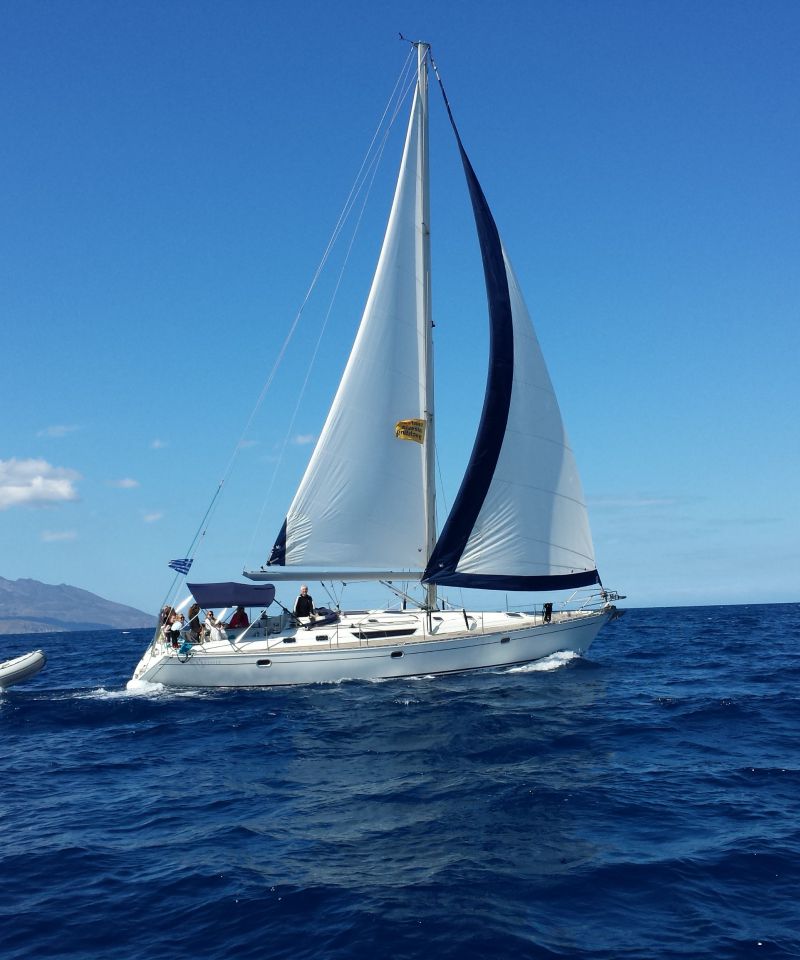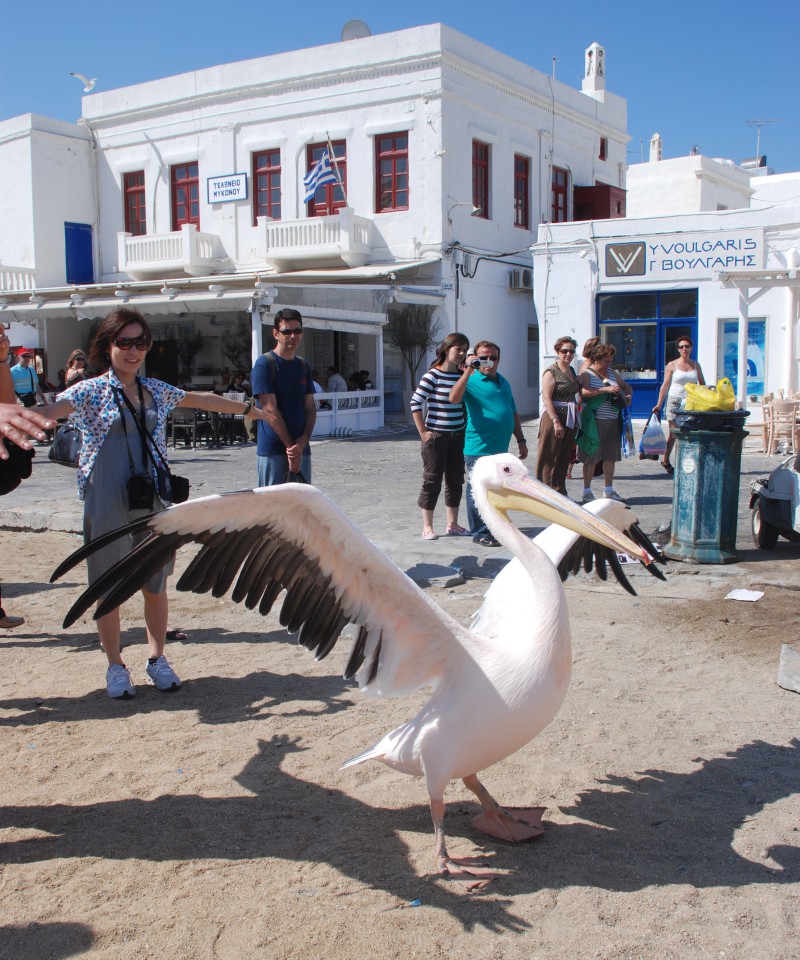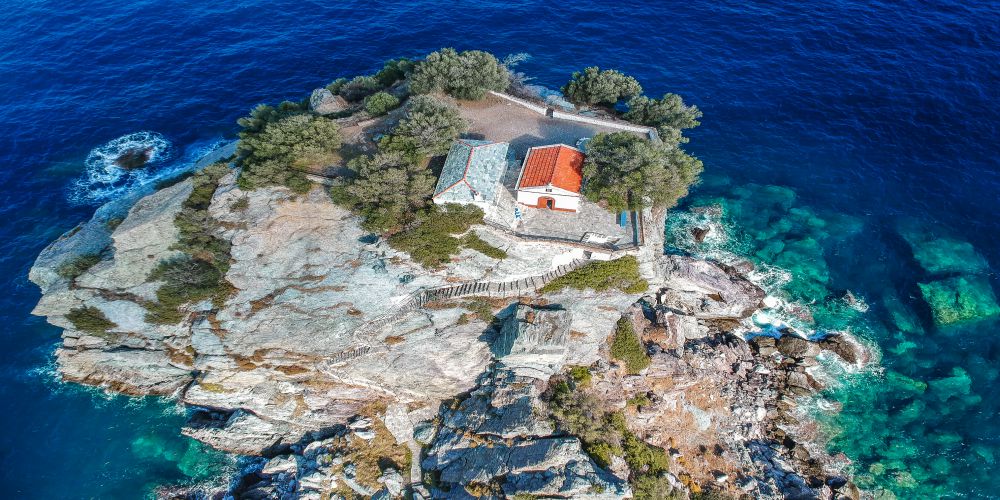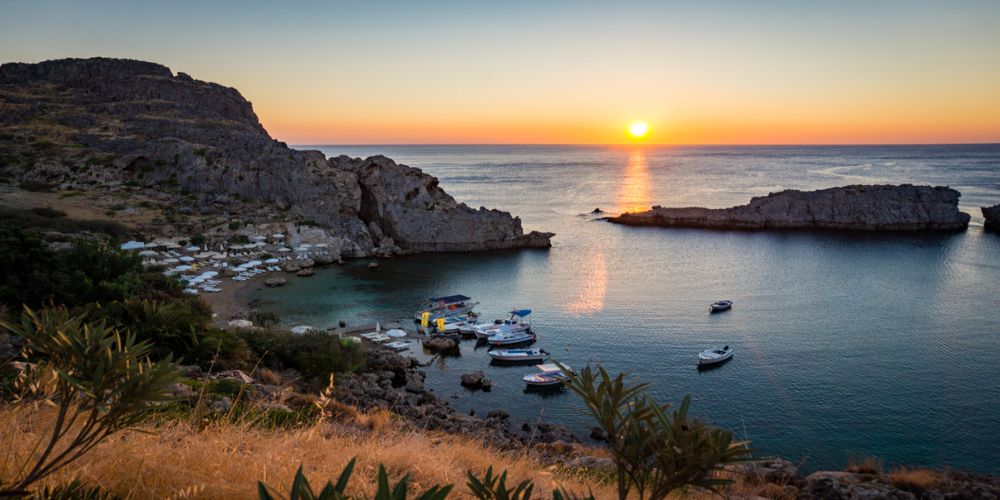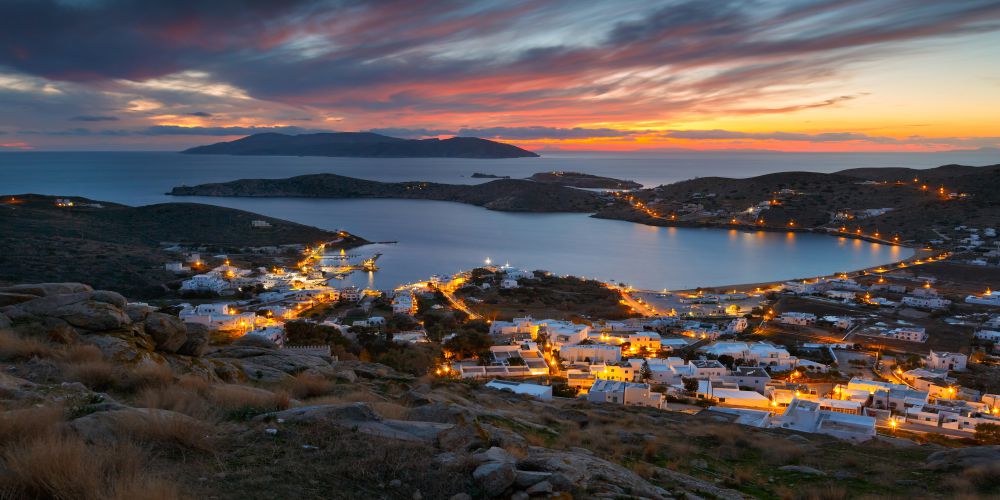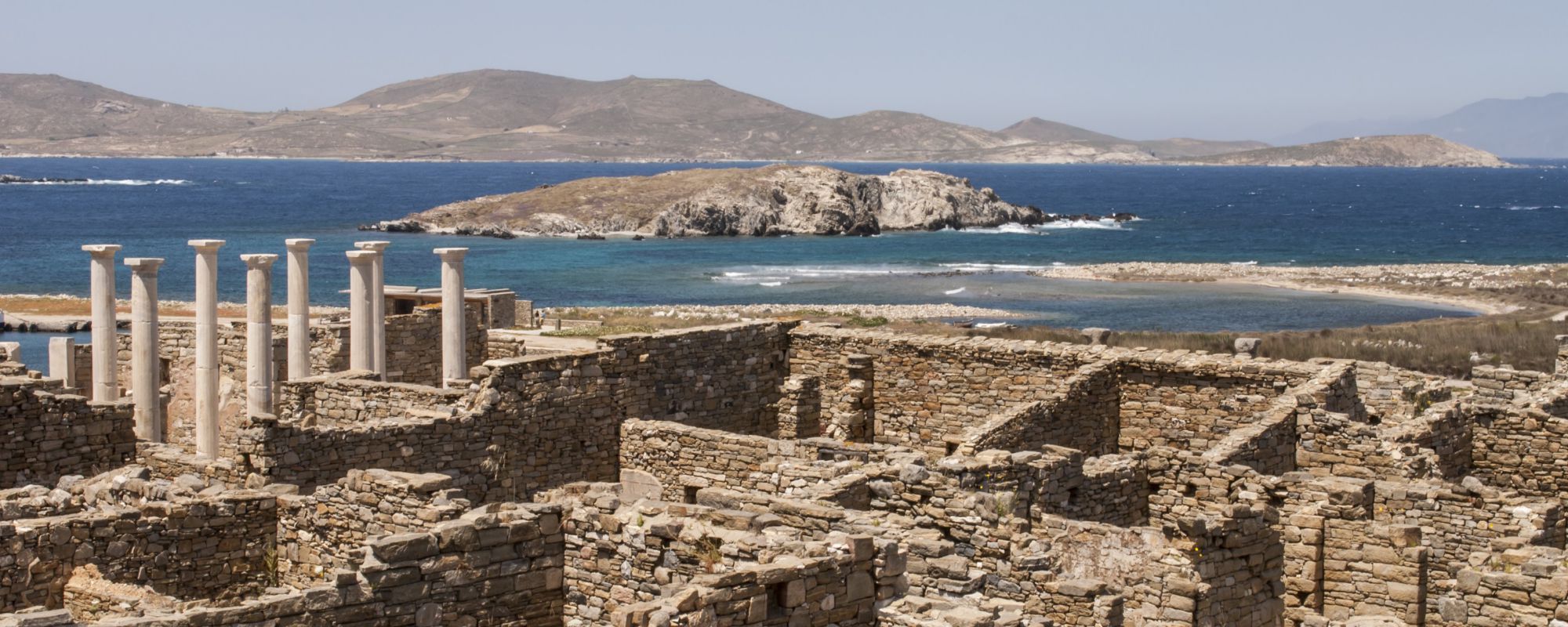
Explore the Historic Island of Delos
Key Takeaways
- Delos is a sacred island with important archaeological sites and is closely tied to Greek mythology.
- It is the only Greek ruin where well-preserved private homes have been found.
- Delos offers a complete picture of ancient Greek architecture, interior layout, materials used, and decoration.
- Visiting Delos allows you to explore Greek heritage and experience the island's rich history firsthand.
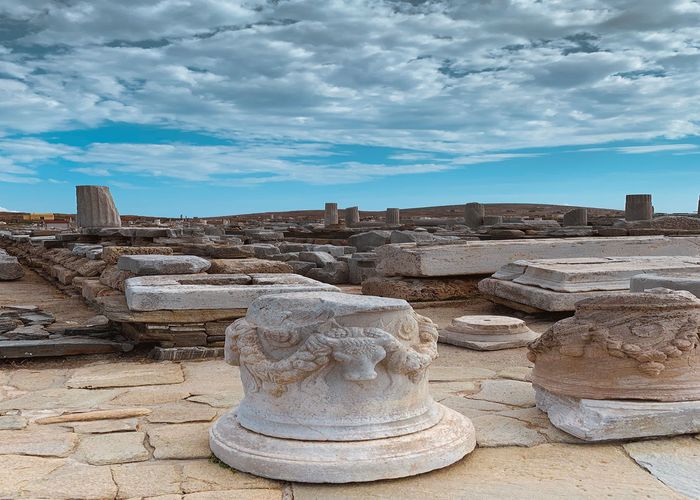 Remnants of the 2nd century on the archaeological site of Delos - credits: discovergreece.com
Remnants of the 2nd century on the archaeological site of Delos - credits: discovergreece.com
Nestled in the heart of the Aegean Sea, Delos stands as one of Greece's most captivating historical and archaeological sites.
This small island, part of the Cyclades archipelago, was once a bustling hub of religious, political, and commercial life in antiquity.
The sanctuary dedicated to Apollo makes Delos a significant religious center in the Archaic and Classical periods.
Visitors to this UNESCO World Heritage Site are often struck by its well-preserved ruins and the sense of history that permeates the air.
Exploring Delos, travelers are transported back in time through its ancient monuments, such as the Agora of the Competaliasts and the iconic Terrace of the Lions.
The island offers a unique glimpse into the past, showcasing the grandeur of Greek civilization.
Historical Significance of Delos
The archaeological site of Delos - credits: discovergreece.com
Delos, a small island in the Cyclades, holds substantial historical and cultural importance. Key points include its role in ancient civilization and its status as a major religious center, particularly related to the worship of Apollo and Artemis.
Ancient Delos: A Cradle of Civilization
Delos was a focal point of trade and politics in the ancient Aegean. The island’s central location made it a key meeting place for commerce between major cities such as Athens, Corinth, and Miletos.
This extensive trade network contributed significantly to its prosperity.
The Delian League, an alliance of Greek city-states under Athenian control, was established in the early 5th century BCE with Delos as its headquarters.
Treasuries and public buildings were erected to support political activities, further solidifying its importance.
Delos also played a role in the transfer and spread of various cultural and economic influences.
Its agora, porticos, and marketplaces were bustling hubs that reflected the island's vibrant intercultural exchanges.
Delos as a Religious Cult Centre
Delos was revered as the birthplace of Apollo and Artemis. According to mythology, their mother Leto gave birth to the twins on this sacred island, under the shadow of Mount Kynthos.
This religious importance attracted pilgrims from across the Greek world.
Sanctuaries dedicated to Apollo, Artemis, and other deities like Athena, Hera, and Isis were prominent.
The Sanctuary of Apollo was particularly significant, featuring monumental temples and altars where elaborate rituals and festivals, such as the Delia, were celebrated.
Archaeological remains, including sculptures, inscriptions, and votive offerings, testify to Delos’s religious stature.
The island's listing as a UNESCO World Heritage Site underscores its historical and spiritual legacy.
Delos remains a testament to ancient Greek religious practices and their widespread impact.
Archaeological Discoveries on Delos
The marble lions on the archaeological site of Delos - credits: discovergreece.com
Delos has yielded a remarkable array of archaeological treasures, revealing its historical significance through extensive excavations.
Key focal points include major findings in structures and artifacts like temples, mosaics, and statues.
Major Excavations and Findings
Excavations on Delos date back to 1872, carried out primarily by the French School école française d'athènes in Athens. These efforts unveiled extensive ruins that shed light on the island’s ancient civilization.
French archaeologists in general played a crucial role in the excavation and research of Delos, while De Boccard, a notable French publishing house specializing in archaeology and the humanities, published many of their findings and reports.
Significant sites include the Sanctuary of Apollo, displaying well-preserved Doric temples and the remains of the Sacred Harbour.
Mount Cynthus is another important excavation area, revealing the presence of numerous shrines and altars.
The Terrace of the Lions, with its famous marble lions, guards the Sacred Lake and is a highlight of the site.
Notable Artifacts and Structures
Among the most notable artifacts unearthed are 354 mosaics, many dating to the late Hellenistic period. These mosaics illustrate the high level of artistry achieved by Delian craftsmen.
The Archaeological Museum of Delos houses extensive collections from the site, including statues, pottery, and everyday items.
Structures like the Doric temples and the theatre demonstrate advanced architectural techniques.
Columns, altars, and the ruins of residential areas provide deeper insights into daily life on Delos during its peak.
The Theater District
The best attraction -in our opinion- of the archeological site of Delos and the entire island is the silver-gray granite alleys that go up to the ancient theatre.
To their right and left, monuments, including the House of Dionysus, the House of Masks, and the House of the Dolphins, are decorated with beautiful, colorful, extremely well-preserved mosaic floors, most of which depict Dionysus on a panther.
At the end of the uphill road, the stone theater with a capacity of 5,500 spectators dating from the 3rd millennium BC century - and which was built to replace a wooden, earlier theater - is only partially preserved. More impressive is the Minoan Fountain, right next to it.
This is the public reservoir carved into the rock in the second half of the 6th century BC. century, which supplied most of the island with water.
If you have practiced your endurance in the sun, you will climb the stairs that lead to the highest point of the island, the "mountain" Kynthos - the altitude of which does not exceed 113 meters.
On the way, you will meet the sanctuaries of foreign gods (Syrian, Egyptian, and Gods of Samothrace). At the top, you will be rewarded for the climb with the panoramic view of the surrounding islands and the clear blue waters that shimmer under the light that right now, up here, you would take an oath that comes directly from the crown of a god leading a chariot with winged horses.
Delos in Greek Mythology
The archaeological site of Delos - credits: exploringworldsoldandnew.com
Delos holds significant importance in Greek mythology as the birthplace of Apollo and Artemis. Its sacred status attracted worshippers and influenced various aspects of Greek art and literature.
Myths and Legends Surrounding Delos
Delos is famed as the birthplace of the twin gods Apollo and Artemis. According to mythology, their mother Leto sought refuge on the island to escape the wrath of Hera, Zeus's wife.
The barren island provided sanctuary, leading to the birth of these important deities.
The island's association with Apollo made it a major religious site. Pilgrims came to Delos to honor the god of music, prophecy, and healing.
Artemis, the goddess of the hunt and wilderness, also contributed to the island's sacred status, attracting devotees who revered her.
Influence of Delos in Greek Literature and Art
Greek literature and art frequently depict Delos due to its mythological importance.
Poets and writers like Homer mentioned Delos in their works, emphasizing its sacred nature. In the Homeric Hymn to Apollo, the island is celebrated for its divine significance.
Artists often illustrated scenes of Apollo and Artemis's births. Statues, reliefs, and pottery items featured these deities, underscoring Delos's impact on visual arts.
The Hellenistic Period saw a surge in artworks depicting the island's mythological heritage.
Even in later periods, the island's legendary status continued to inspire creative expressions, reflecting its enduring legacy in Greek cultural history.
Delos as a UNESCO World Heritage Site
Delos - credits: naxosyachtcharter.com
Delos, a small island in the Aegean Sea, carries immense historical and cultural significance. Designated as a UNESCO World Heritage Site, this island rivals others due to its archaeological treasures and mythological importance.
Criteria for UNESCO Designation
UNESCO designated Delos as a World Heritage Site in 1990. This was based on its exceptional archaeological site, which provides a vivid image of a major Mediterranean port of ancient times.
The island played a crucial role in the development of Greek architecture and urban layout.
Delos holds immense mythological value as the birthplace of Apollo and Artemis, making it a focal point of ancient Greek religious practices.
The Heraion and other sanctuaries underline its religious heritage.
Its cosmopolitan nature is reflected in the various civilizations that left their mark over millennia.
Visiting Delos Today
The archaeological site of Delos - credits: journeygreece.com
Visitors to Delos can anticipate an enriching experience marked by historical sites, easy access from Mykonos to its free port, and practical tips to enhance their journey.
This guide provides specific details to optimize your visit.
How to Get to Delos
Reaching Delos is straightforward, particularly from Mykonos.
Ferries operate daily from the old port of Mykonos to Delos except during certain religious holidays.
Typical departure times are at 9 am, 10 am, 11:30 am, and 5 pm, with returns at 12 pm, 1:30 pm, 3 pm, and 7:30 pm.
The ferry journey takes about 30 minutes, providing picturesque views of the surrounding Mediterranean.
Remember to check the weather conditions as services can be affected by high winds.
Key Attractions and Sites to Visit
Delos offers numerous historical sites.
Among the most notable landmarks are:
- The Sacred Precinct with its three temples dedicated to Apollo.
- The Terrace of the Lions features ancient statues symbolizing the island's significance.
- The Museum of Delos houses various artifacts unearthed from the island.
Don't miss the Theatre and the remains of the Stadium, which illustrate the island's former glory.
The well-preserved ruins provide a glimpse into ancient Greek civilization.
Tips for Travelers
- Plan to arrive early to avoid crowds and heat, as Delos can get quite hot during midday.
- Bring water, sunscreen, and a hat for protection against the sun.
- Consider hiring a guided tour to gain deeper insights into the island's history.
- Wear comfortable shoes since you will walk over uneven terrain.
- Lastly, ensure to check ferry schedules in advance to align with your desired visit times, and be prepared for potential delays due to weather.
The Museum of Delos
Delos Museum - credits: realgreekexperiences.com
Among the exhibits of the Delos Museum, you will find the findings of the excavations that took place in the archaeological site of Delos and that have not been transferred to the Archaeological Museum of Athens, the Louvre, the British Museum, Venice, and the rest of Europe.
Perhaps the most important find of the excavations, the lions of Delos, are all housed in a bluish, elongated room with two rows of windows - skylights on the two side walls, except for one, which adorns a square in Venice.
Entry into this inspired room is forbidden. The visitor has visual contact with the imposing lions from the side, as they stand in the narrow opening of the narrow and long hall.
For the record, the exhibits are particularly interesting and of great historical importance, showcasing the cultural heritage of the island and the whole country.
You will need about half an hour to see all the rooms in the museum.
The Best Beaches Nearby
Aerial view of the sea of Delos - credits: athenstourgreece.com
Delos is not all about Greece's cultural heritage, archaeological sites, and sacred way, it also has amazing beaches for your swimming endeavors and neighboring islands full of beauty.
You can dive at Fourni Beach, which you will reach if you follow about 15 minutes the relatively inaccessible path that starts on the right of the port as you look inland.
Some of you may not even know its existence, but the nearby island of Rhenia is known to the people of Mykonos as it is separated from Delos by a small strait.
Its characteristic is its secluded and, at the same time, uniquely beautiful beaches.
To visit these beaches, named Glyfada, Stena, Lia, and Ampelia, you must go by boat unless you are on a cruise already.
The sea has a turquoise color that changes as you approach the shore. It is good to start in the morning, to enjoy your swim, the sun and your walk around the coast.
Of course, the best way to visit Delos and swim in the gorgeous water nearby is by joining our Mykonos Full-Day Sailing: Delos Guided Tour & Rhenia Swimming alone or with your family and friends.
Final Thoughts
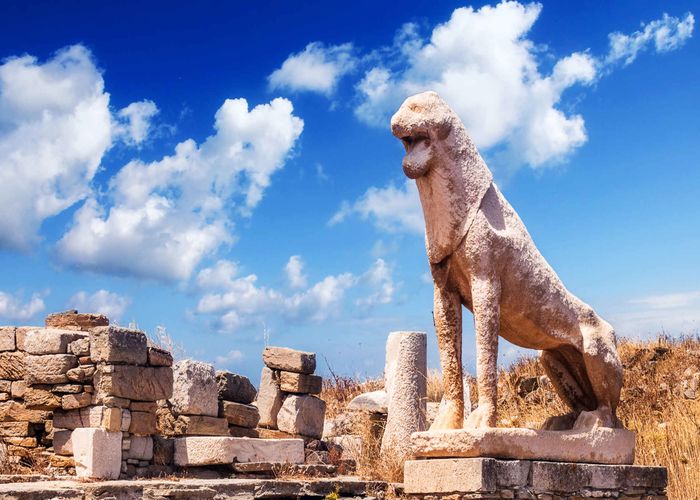
If you visit Greece, the neighbouring islands of the Cyclades, and especially Mykonos, with its great cosmopolitan Mediterranean port, you should definitely visit this small island.
It is considered an earthly paradise, especially for those who appreciate Greek history, its archaeological sites, and its cultural heritage, as well as the crystal-clear waters of the Aegean sea.
Sail to Delos, get acquainted with its religious significance in ancient times as far back as the 2nd century, and let the magical world of ancient Greece sweep you off of your feet!





